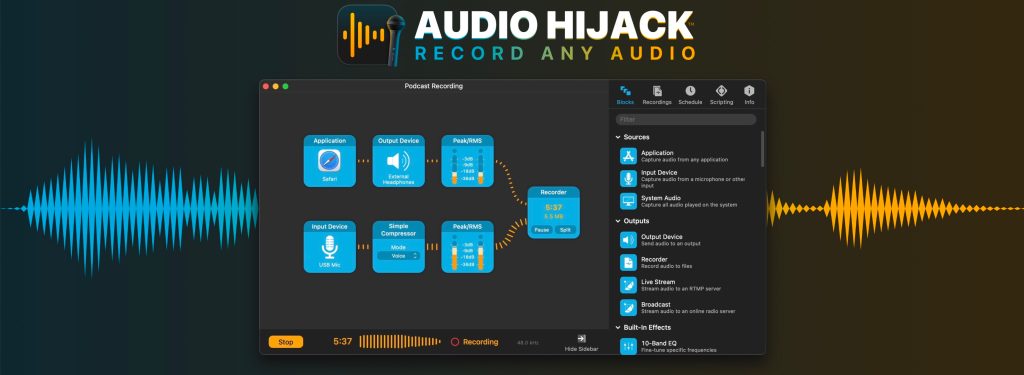
Rogue Amoeba’s Audio Hijack is one of the most powerful audio apps on the Mac, allowing you to record any audio, from any source. In a new blog post, Rogue Amoeba CEO and cofounder Paul Kafasis reveals how the Recording Industry Association of America pushed to have the app shut down… but Steve Jobs stepped in to save it.
The story starts with Rogue Amoeba spotting an order from a customer with an RIAA email address back in September 2003, one year after Audio Hijack first launched on the Mac. “That put a damper on our first anniversary celebrations, as we had full knowledge of the organization’s litigious history,” Kafasis recalls. “We were naturally concerned that they were aware of our product.”
Despite the suspicious order, however, Rogue Amoeba never heard a word from the RIAA or any of its lawyers. “We eventually came to assume that they recognized our tool’s many legitimate fair uses,” Kafasis writes.

In a recent interview, however, Adam Curry spilled the details on just how close the RIAA came to having Audio Hijack shut down. Curry was one of the early voices in the podcasting industry, and even back then, Audio Hijack was an instrumental app for podcasters.
In the interview, Curry recounted that he had a meeting with Steve Jobs and Eddy Cue in 2005 about podcasting and iTunes. As it turns out, the RIAA went directly to Apple to request Audio Hijack shut down, bypassing Rogue Amoeba altogether. When Jobs learned how important Audio Hijack was for podcasters, he told the RIAA to bug off.
From Curry’s interview:
And in that very meeting, Steve asked: “How do you do your recording?”. We didn’t really have any tools to record, there was not much going on at the time. But the Mac had an application called Audio Hijack Pro, and it was great because we could create audio chains with compressors, and replicate a bit of studio work.
Eddie Cue said: “The RIAA wants us to disable Audio Hijack Pro, because with it you could record any sound off of your Mac, any song, anything”. Steve then turned to me and said: “Do you need this to create these podcasts?”. I said: “Currently, yes!”. So Steve Jobs told them to get lost, and I thought: “Hey man, thanks, Steve’s on my side. That’s cool.”.
“Even 18 years on, I find this story rather terrifying,” Kafasis says. “If not for an offhand conversation in which we had no involvement, things could have turned out very differently for our company.”
I encourage you to check out Curry’s full interview here, as well as Rogue Amoeba’s latest blog post here.
Follow Chance: Twitter, Instagram, and Mastodon
FTC: We use income earning auto affiliate links. More.

Comments